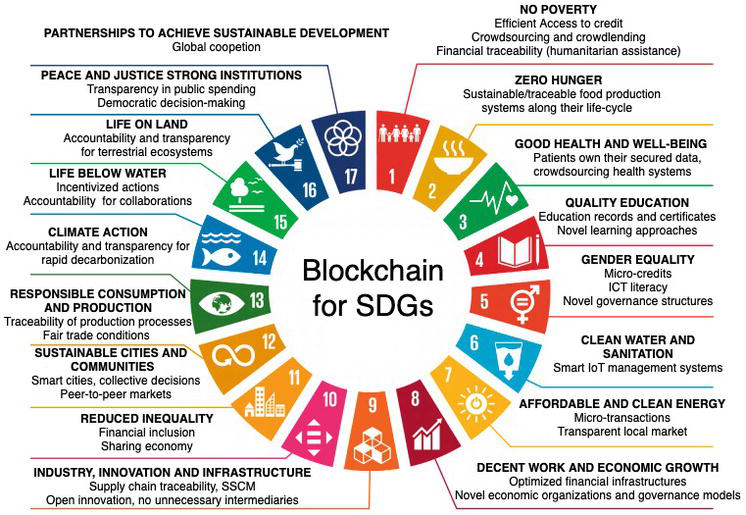Is Blockchain the Key to Sustainability?
The word ‘blockchain’ has become ubiquitous with cryptocurrency, but the technology has applications far beyond finance. There is growing interest in using blockchain technology to solve global sustainability problems.
Blockchain is defined as “a distributed database that maintains a constantly growing list of transaction records, referred to as blocks, and in which every block contains a link to the previous block. More specifically, it is an open and distributed ledger that captures transaction data between two parties in a permanent and verifiable way.”
Blockchain is being used to support social initiatives like responsible sourcing and supply chain management by providing improved visibility and early detection of unethical producers and products. The numerous ways blockchain can support the United Nations Sustainable Development Goals which are highlighted in the graphic below.
The World Economic Forum identified three key ways that blockchain can support sustainable development:
Building resilient and transparent supply chains
Creating stronger and more accountable public institutions
Spurring responsible sourcing and consumption, which is at the forefront of the environmental movement
The UN Global Compact and BSR recently launched a global guide to traceability for sustainability, underscoring the importance of this issue and the need for immediate action. As pressure mounts for companies and industries to ensure the integrity and sustainability of their products, technologies like blockchain will play an important role.
Peer Ledger’s MIMOSI Connect is a game changer because it gives companies a trusted, immutable record of transactions, documents, and metrics across their entire supply chain to support responsible supply chain management and due diligence. We believe that responsible supply chains are the future and we strive to make traceability available to companies of all sizes.
Responsible supply chains make stronger brands.
References
Rick Leblanc (January. 2020), How Blockchain Will Transform Supply Chain Sustainability, The balance small business. Retrieved from https://www.thebalancesmb.com/blockchain-and-supply-chain-sustainability-4129740
Paula Fraga-Lamas and Tiago M. Fernández-Caramés (May, 2020), Leveraging Blockchain for Sustainability and Open Innovation: A Cyber-Resilient Approach toward EU Green Deal and UN Sustainable Development Goals, Intech Open publisher. DOI: 10.5772/intechopen.92371
Sumedha Deshmukh (September, 2020), 3 ways blockchain can accelerate sustainable development, World Economic Forum. Retrieved from https://www.weforum.org/agenda/2020/09/3-ways-blockchain-can-contribute-to-sustainable-development/
Norton et al (April, 2014), A Guide to Traceability: A Practical Approach to Advance Sustainability in Global Supply Chains, BSR. Retrieved from https://www.bsr.org/en/our-insights/report-view/a-guide-to-traceability-a-practical-approach-to-advance-sustainability-in-g


